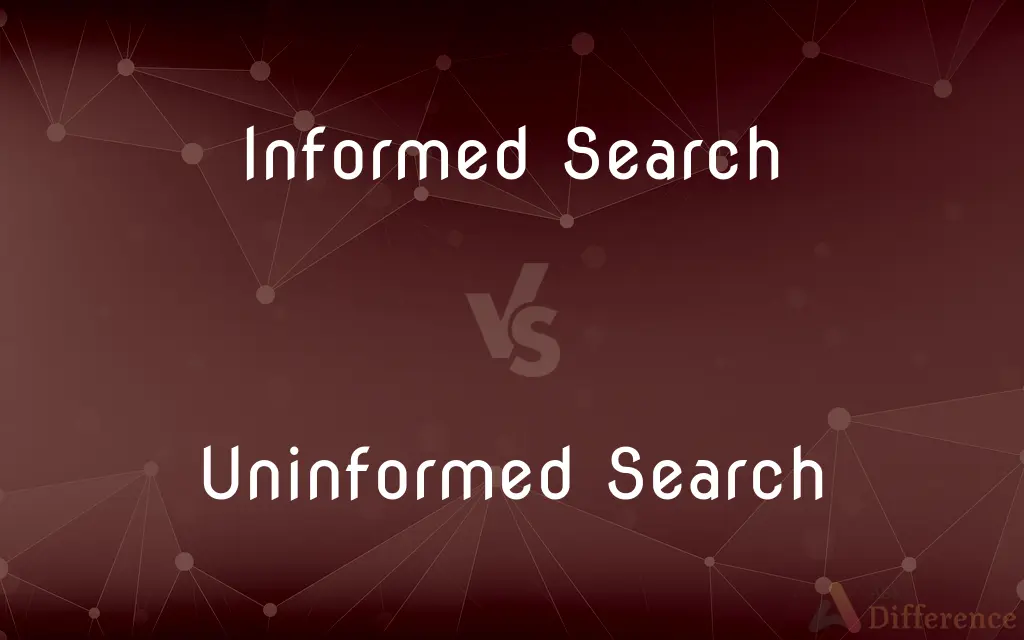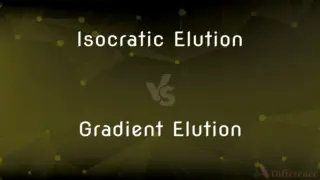Informed Search vs. Uninformed Search — What's the Difference?
By Tayyaba Rehman & Urooj Arif — Published on January 31, 2024
Informed Search uses additional information or heuristics to guide search; Uninformed Search explores options without any domain-specific knowledge, relying on trial and error.

Difference Between Informed Search and Uninformed Search
Table of Contents
ADVERTISEMENT
Key Differences
Informed Search, also known as heuristic search, involves using specific knowledge or heuristics about a problem to find solutions more efficiently. In contrast, Uninformed Search, or blind search, does not have such additional information and explores the search space without guidance.
Informed Search is often faster and more efficient as it can intelligently narrow down the search space, thanks to its use of heuristics. Uninformed Search methods, on the other hand, systematically explore the search space and are typically slower due to lack of guidance.
Examples of Informed Search algorithms include A* and Greedy Best-First Search, which use heuristics to estimate the best path to a goal. Uninformed Search algorithms like Breadth-First Search and Depth-First Search explore all paths equally without such estimations.
Informed Search is ideal for complex problems where some understanding of the problem space is available. Uninformed Search is suitable for simpler problems or when little is known about the domain.
In summary, Informed Search leverages additional knowledge for efficient searching, while Uninformed Search operates without this advantage, leading to a broader but less directed exploration.
ADVERTISEMENT
Comparison Chart
Knowledge Utilization
Uses heuristics or domain knowledge
Lacks additional domain-specific knowledge
Efficiency
Generally more efficient
Less efficient, explores all possibilities
Example Algorithms
A*, Greedy Best-First Search
Breadth-First Search, Depth-First Search
Suitability
Better for complex problems
Suitable for simpler problems or unknown domains
Search Direction
Directed and focused on likely solutions
Broad and unfocused exploration
Compare with Definitions
Informed Search
Focuses on probable solutions for faster results.
Using Informed Search, the algorithm efficiently found the solution.
Uninformed Search
Relies on trial and error in problem-solving.
The algorithm used Uninformed Search to systematically test each option.
Informed Search
Often used in complex problem-solving scenarios.
AI systems frequently employ Informed Search strategies.
Uninformed Search
Applicable when problem specifics are unknown.
In the absence of specific information, Uninformed Search was the best choice.
Informed Search
A search method using heuristics for efficiency.
Informed Search was used to quickly navigate the complex maze.
Uninformed Search
Explores the search space systematically.
Uninformed Search methodically examined every possibility.
Informed Search
Employs additional knowledge about the problem space.
The robot used Informed Search to find the shortest path.
Uninformed Search
Less efficient but thorough in exploration.
Although slower, Uninformed Search left no stone unturned.
Informed Search
Guides the search process towards the goal.
Informed Search was crucial in optimizing the search algorithm.
Uninformed Search
A search strategy without specific domain knowledge.
Uninformed Search was used to explore all possible moves in the puzzle.
Common Curiosities
What is Informed Search?
A search strategy that uses additional knowledge or heuristics.
Can Informed Search always find the best solution?
It's more likely to, but not guaranteed, depending on the heuristics used.
How does Informed Search improve efficiency?
By using heuristics to focus the search on likely solutions.
Does Informed Search require more computational resources?
It can, due to the complexity of heuristics.
What are some examples of Informed Search algorithms?
A* Search and Greedy Best-First Search are common examples.
Is Uninformed Search easier to implement?
Yes, often due to its straightforward nature.
Can Uninformed Search handle large search spaces effectively?
It can be challenging due to its exhaustive nature.
What defines Uninformed Search?
A search approach without specific domain knowledge.
Is Uninformed Search less effective than Informed Search?
Generally, yes, in terms of efficiency and time.
In what scenario is Uninformed Search used?
When little to no specific information about the problem is available.
What are common Uninformed Search techniques?
Breadth-First and Depth-First Search are typical examples.
Are there hybrid search methods combining both strategies?
Yes, some algorithms use a mix of informed and uninformed strategies.
How do heuristics influence Informed Search?
They guide the search towards more promising paths.
Is Informed Search always faster than Uninformed Search?
Generally, but it depends on the problem and heuristics used.
Can Uninformed Search miss solutions?
Not typically, as it explores the entire search space.
Share Your Discovery

Previous Comparison
Isocratic Elution vs. Gradient Elution
Next Comparison
MAN vs. WANAuthor Spotlight
Written by
Tayyaba RehmanTayyaba Rehman is a distinguished writer, currently serving as a primary contributor to askdifference.com. As a researcher in semantics and etymology, Tayyaba's passion for the complexity of languages and their distinctions has found a perfect home on the platform. Tayyaba delves into the intricacies of language, distinguishing between commonly confused words and phrases, thereby providing clarity for readers worldwide.
Co-written by
Urooj ArifUrooj is a skilled content writer at Ask Difference, known for her exceptional ability to simplify complex topics into engaging and informative content. With a passion for research and a flair for clear, concise writing, she consistently delivers articles that resonate with our diverse audience.












































